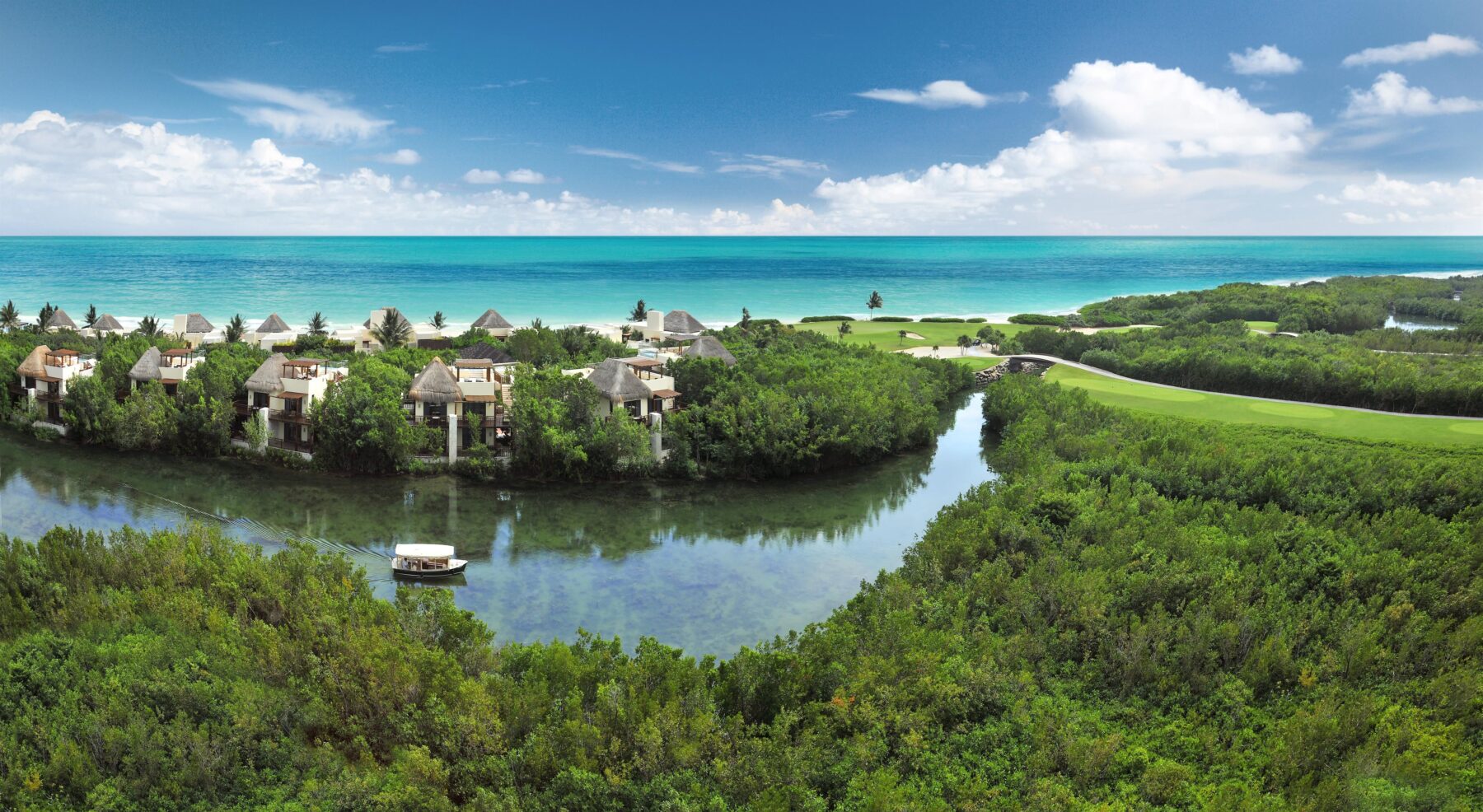Celebrated on Sep. 27 every year, this year the United Nations World Tourism Organization is highlighting “Tourism & Green Investments,” prioritizing tourism’s recovery and future growth in sustainable development.
From the Maldives to Chicago, companies and brands in the tourism industry are taking notice in the need for green investments.
Let’s take a look at 11 destinations from around the world that offer the best in green hospitality.
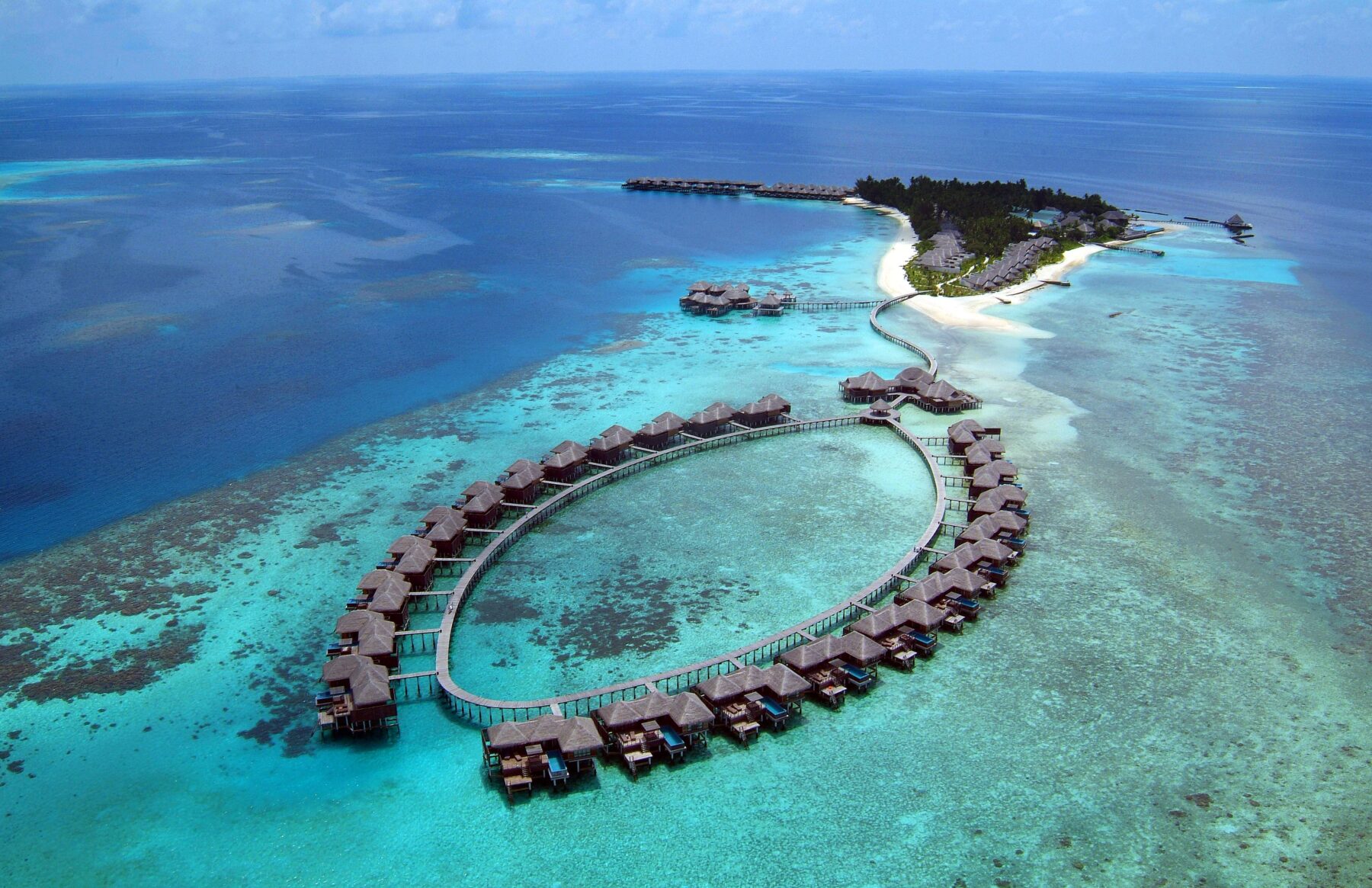
Comprised of two different boutique island resorts, Coco Bodu Hithi and Coco Palm Dhuni Kolhu, Coco Collection creates a unique Maldivian experience ranging from luxe amenities to eco-forward initiatives for guests to enjoy during their stay. The resorts’ marine life development (including coral and tree planting), Chef’s Garden, the Olive Ridley Project (a turtle rehabilitation program), and more, create a way for guests to get involved in their conservation efforts. Each island resorts’ location in the Baa Atoll lends way to a richly diverse marine biodiversity and the resorts strongly believe in protecting the beautiful surroundings they invite guests to enjoy. The resorts host educational programming that takes guests on a journey along with associates on coral tree planting sessions, reef clean-ups, and fish ID snorkeling. Coco Collection’s onsite marine educators provide guests with the opportunity to learn more about the underwater ecosystem through guided experiences. Including a link here with more information on the resorts’ continued investment in sustainability efforts.
Ocean Club Resorts, Providenciales in Turks & Caicos
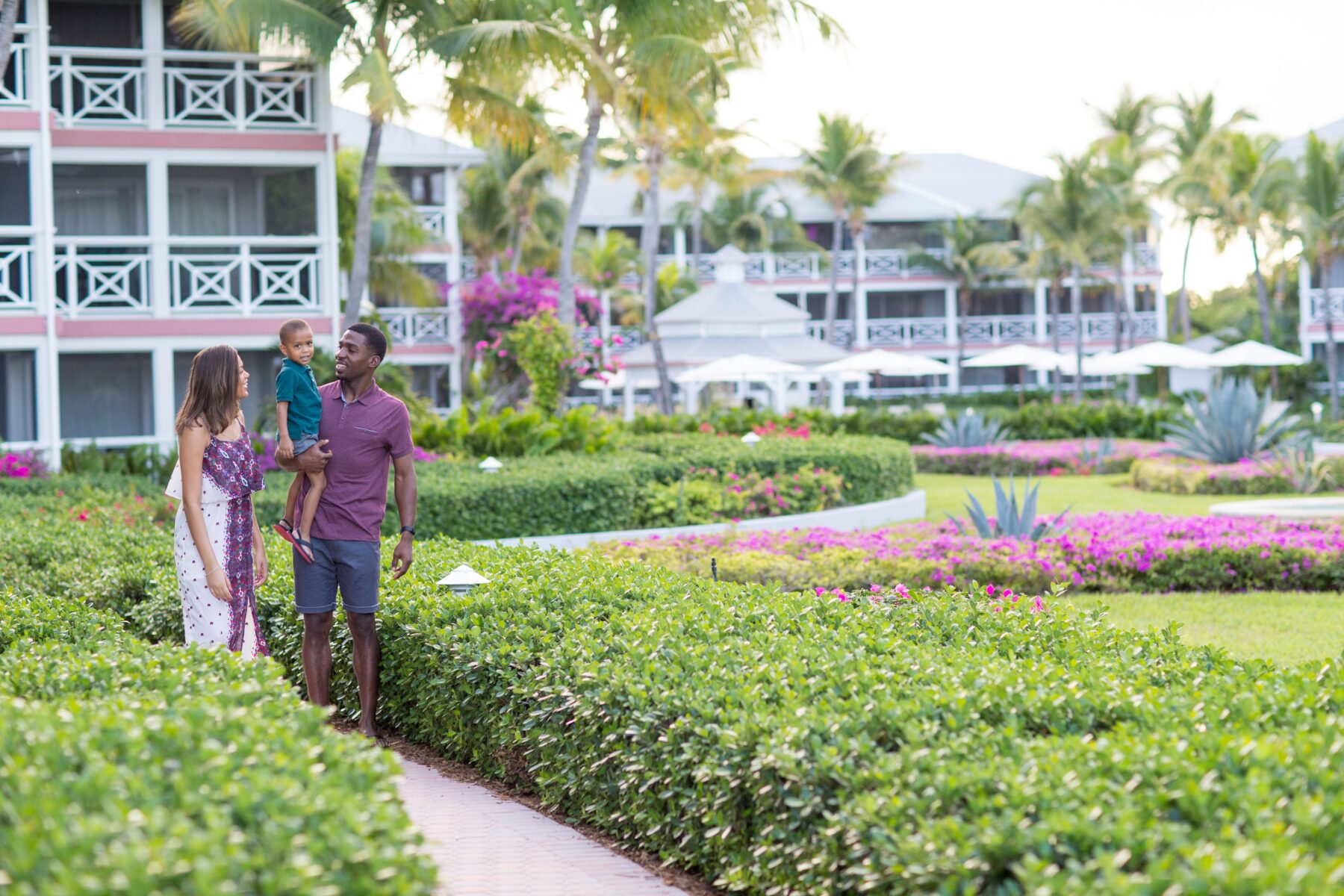
Located directly along the world-renowned Grace Bay Beach, sits Ocean Club Resorts, two all-suite properties that provide the ideal open-air setting and direct beach access for guests of all ages to enjoy. The resorts were the first properties to be Green Globe Certified in the Turks & Caicos Islands. Leading the way in sustainability, the resorts had to pass a series of rigorous eco-friendly tests and audits that measured their efforts and ultimately deemed them certifiable by the globally recognized Green Globe program. A few of the eco-forward initiatives that made the resorts eligible for the certificate include: placing cloth reusable shopping bags in each suite; replacing plastic straws with paper and Styrofoam containers with paper boxes; use of LED lighting, encouraging guests in each suite to reduce water and energy use waste during their stay. By purchasing eco-friendly products, partnering with like-minded vendors and making sound eco-operation decisions while continuing to provide a high level of service for their guests, the resorts create a more sustainable travel destination. Additionally, the resorts have recently premiered a carbon footprint calculator. This new tool provides guests with the opportunity to offset the eco-impact of their stay.
As a family-owned (and managed) independent property, Hotel Belmar has been an integral part of Costa Rica’s Monteverde community since it opened in 1985. Over the years, Hotel Belmar has crafted an organic hospitality model rooted in eco-friendly practices and innovation, pioneering programs that leverage unique aspects of hospitality to further sound environmental stewardship, regeneration of the ecosystem and economic benefit to the local communities. Hotel Belmar’s long-standing commitment to sustainability is evidenced in the scope, strength, and growth of its initiatives, including its authentic farm experience Finca Madre, which uses the Biointensive Agricultural Method. Finca Madre Tierra is the first agricultural project of its kind in Costa Rica to earn carbon-neutral certification. SAVIA, the Hotel’s own private reserve, engages raw nature, non-invasive architecture, and science to highlight the holistic connection between the human soul and the forest.
HOTELES XCARET, Riviera Maya
Grupo Xcaret, a leader in sustainable tourism and recreation for more than 30 years, has consistently embraced the concept of cultivating economic, sociocultural, and environmental value in a harmonious manner to ensure the growth of their business. Guided by their overarching vision, the company developed a Sustainability Policy and their Xustainability Model consisting of three core pillars known as the “3P”: people, planet and prosperity always considering the impact they have on the environment.
The brand launched their hotel portfolio in Riviera Maya in 2018 with the opening of Hotel Xcaret Mexico, an all-inclusive luxury resort located along the shores of the Mexican Caribbean Sea, featuring eco-integrated architecture and design infused with a passion and respect for nature and Mexican culture. In 2021, Grupo Xcaret opened two additional luxury all-inclusive properties, Hotel Xcaret Arte and the ultra-luxury boutique hotel, La Casa de la Playa.
Located in the Mexican jungle, Grupo Xcaret relocated 80% of the trees and plants that were displaced during the resorts’ construction, serving as a testament to their unwavering dedication to the preservation and safeguarding of nature. These resorts, catering to both families and adults, pay homage to Mexican culture and use many décor items handmade by local Mexican artisans in all their suites. Among their many sustainability efforts, the resorts have adopted the use of salt, rather than chlorine, for treating their pools and water features, provide guests with reusable cups, filled over 2,600 bottles of water daily on-site and grow organic herbs within their on-site garden for use in its restaurants, among many others. Each resort offers a large variety of culinary options within their on-site restaurants led by renowned and Michelin-starred chefs. Complementing this, the Muluk Spa provides a comprehensive spa and wellness program set among natural rocks and rivers. Additionally, the resorts offer complimentary transportation to and from the airport, as well as the All-Fun Inclusive® program providing guests unlimited access to the most iconic parks in Cancun and Riviera Maya including Xcaret, Xel-Ha, Xplor, Xplor Fuego, Xavage, Xenses, and others.
Through its foundation, Grupo Xcaret has extended its commitment to fostering sustainable tourism across its trio of hotels and extensive array of parks and tours. Notable efforts include: a responsible waste separation and disposal program, the implementation of a sewage treatment plant program, the installation of an osmosis treatment facility, and the installation of water fountains for employees and guests to help reduce single-use plastics. In addition, Grupo Xcaret also promotes and supports the consumption of local and regional products, the creation of the Riviera Maya Forest nursery, initiatives like the mangrove restoration project and the rehabilitation of the Nichupte Sistema lagoon, as well as the Escuela Verde project (reforestation in public schools in Quintana Roo) and the protection of beaches.
Dominica is acclaimed for its commitment to become the world’s first climate-resilient nation, making the Nature Island the Caribbean’s most environmentally conscious island. The island is creating a pathway for green industrialization by leveraging their natural resources to combat climate change and ensure resilience. Over the past decade, Dominica has been working towards replacing diesel-generated electricity with more sustainable options. Most recently, Dominica has completed drilling the wells needed for their first ever geothermal power plant, which is expected to be completed within two years, making Dominica one of the first islands in the Caribbean to successfully replace fossil fuel-generated energy with green energy. Voluntourism in Dominica focuses on assisting communities to improve the lives of its residents through specific projects such as education, agriculture and environmental activities. It follows the trend toward economically, environmentally and socially responsible tourism, with the end goal of improving lives on the island.
Sustainability is enshrined in Dominica’s entire tourism product, offering many activities for travelers to immerse themselves in the natural wonders on the island, while also educating travelers on the importance of protecting the abundant nature and wildlife. Their extensive natural park system and water marine parks are protected, and the island has a complete ban on single-use plastics on styrofoam, ensuring these harmful materials stay out of the ocean.
Additionally, visitors to the island have many accommodations to choose from, all of which put sustainability at the forefront of their offerings. Many of the island’s hotels are built using sustainable methods and materials, and each hotel has its own mission of sustainability. For those looking for a sustainable yet luxurious stay, the Intercontinental Dominica Cabrits Resort and Spa, Jungle Bay and Secret Bay are perfect options. For those looking for sustainable, one-of-a-kind stays, Coulibri Ridge and Fort Young Hotel do not disappoint.
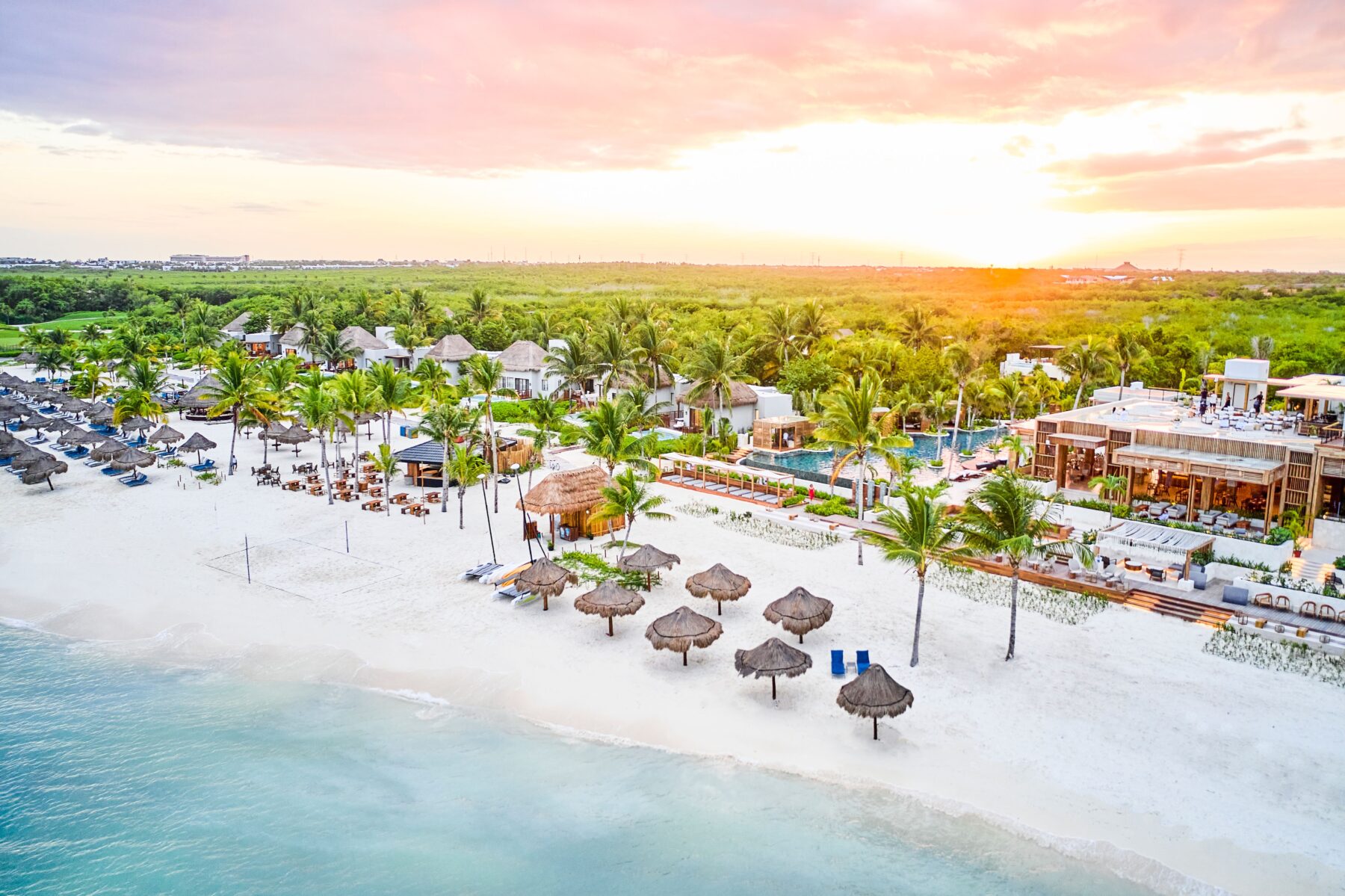
Fairmont Mayakoba is a AAA five-star diamond luxury resort located in Riviera Maya that truly sets the industry standard as a sustainable resort. From the very early stages of development, sustainable land and water management have been critical for Fairmont Mayakoba. The unique freshwater canal system that weaves its way through the resort’s thick jungle and mangroves was created by tapping into one of the world’s most extensive underground river systems that lies below Yucatan. By bringing fresh water to the surface in a highly protected area, the resort created a viable and flourishing ecosystem, which has seen an increase in population of many species that call Mayakoba home.
Most recently, Fairmont Mayakoba was awarded its 10th consecutive Sustainable Tourism Certificate by Preferred by Nature ™, an international non-profit organization that seeks to improve land management and business practices that benefit people, nature and the climate.
Fairmont Mayakoba also has a Coral Reef Restoration Program in partnership with Oceanus AC that provides guests with the opportunity to help save the planet by restoring the Mesoamerican Reef, the second largest in the world. This reef expands in front of Mayakoba’s beach, and guests can sail away in a guided catamaran to experience how baby corals are being reintroduced to the ocean. Since the partnership began in May 2015, Fairmont Mayakoba has focused on rebuilding coral reefs by creating nurseries which has led to the transplantation of more than 1,500 corals with an 80% survival rate that continues to grow.
As an Accor property, Fairmont Mayakoba is doing its part to reach all priority sustainability goals, including reducing food waste by 60% by 2030, and reaching net-zero carbon emissions by 2023.
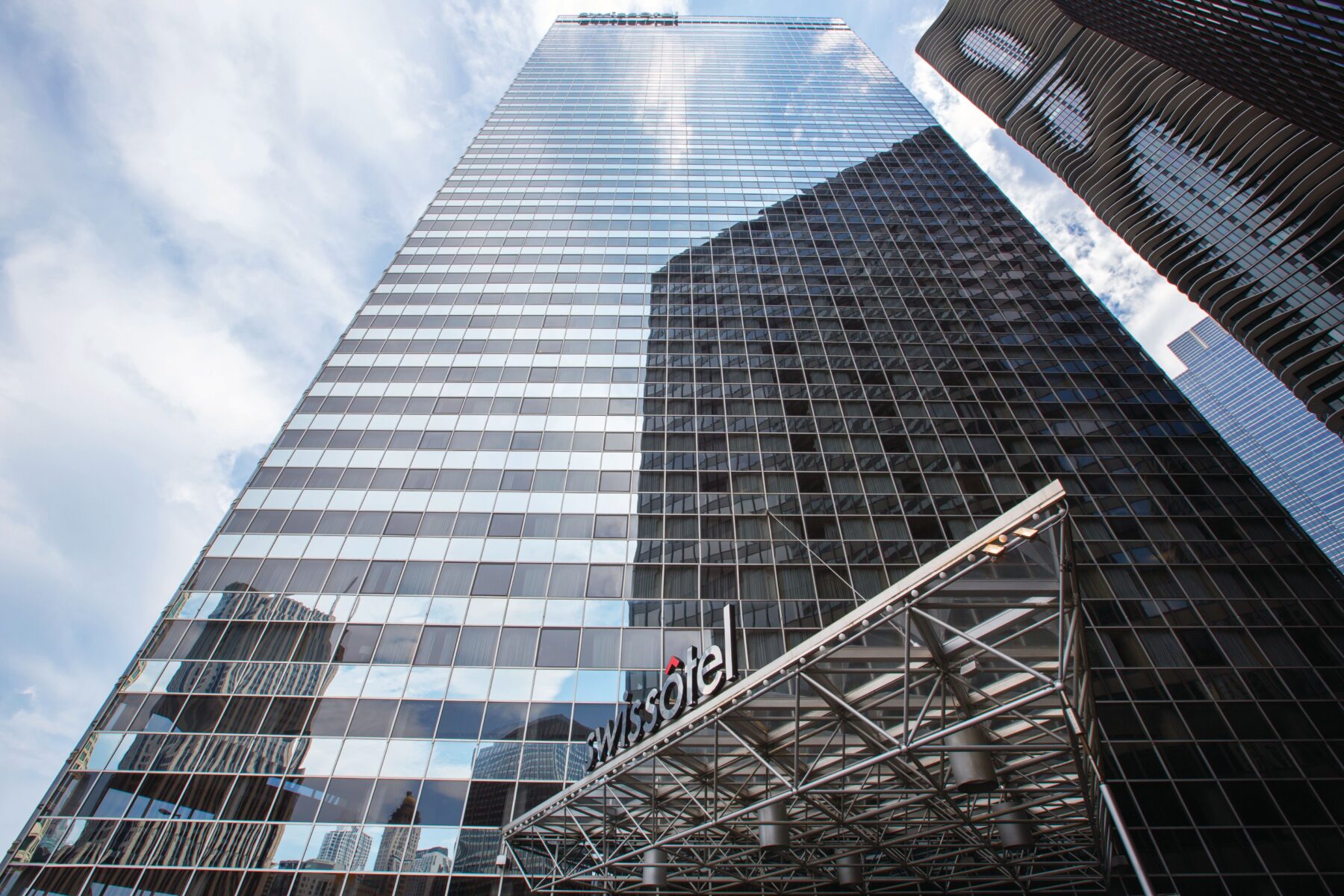
At Swissotel Chicago, located in the heart of downtown Chicago, sustainability is not just a buzzword – it’s a passion and in their Swiss roots to care for the planet and the people around them. The hotel is designed to promote sustainability in ways that enhance guest’s well-being, from the architectural design through to the genuine and natural materials they use. Approximately 80% of lighting is from energy efficient products, such as LED’s, and all guest room thermostats are connected to an energy management system that reduces usage. Swissotel Chicago was one of the first hotels in the city to install low-flow toilets in every guest room, with a 50% reduction in water.
Swissotel Chicago’s culinary team utilizes an Eco-Digesting machine that breaks down food waste and returns tens of thousands of gallons of water to the ecosystem per year. The digester also reduces the need for trash bags, preserving valuable landfill space. During the warmer months, guests can discover the world of urban beekeeping through their partnership with Alveole Honey Bees.
As an Accor property, Swissotel Chicago is committed to reducing absolute emissions 46% by 2030 and plans to reach net-zero carbon emissions by 2050. Accor is the first international hotel group to make this kind of long-term commitment. Through their Solidarity Accor endowment fund, Accor has supported over 330 projects globally, involving 20,000 employees and benefitting 450,000 beneficiaries.
Sun Outdoors, a leader in outdoor hospitality and part of Sun Communities, adopted goals to achieve carbon neutrality in 2035 and Net Zero Emissions by 2045, with efforts to achieve including expanded use of renewable energy, increased building efficiencies through use of energy-efficient lighting and building materials, reduced total waste and partnerships within their supply chain to collect emissions data on products and services.
Sun Outdoors continues to be committed to environmental best practices and the vacation locations throughout the U.S. are certified Plan-It Green Friendly through the National Association of RV Parks & Campgrounds (ARVC). The locations must meet at least nine of the sixteen criteria to achieve this certification. The company is also committed to managing biodiversity and habitats of the natural environment they operate in, utilizing native plants and trees when designing and managing landscapes and working to implement appropriate management and protections for endangered or threatened species that have been identified on property.
Examples of Sun’s unique green-friendly parks include Sun Outdoors Paso Robles in California, whose water-saving initiatives include irrigating its landscaping with recycled wastewater. Sun Retreats Avalon, located in Cape May Court House, New Jersey, was recognized during the 2022 ARVC Awards of Excellence last November, receiving the Plan-It Green Friendly Park award for continuing to show leadership, innovation and commitment to running a green resort. The destination demonstrates a commitment to the Plan-It program mission by implementing environmentally friendly and sustainable practices onsite and providing educational programming focused on conservation, wildlife preservation and nature education. Unique onsite offerings include partnerships with Cape May County Zoo, The Wetlands Institute, a local butterfly expert, the Cape May County Fire Department and more to help provide guest and team member education. Sun Communities 2022 ESG Report can be found HERE.
Finland is not only the six-time world happiest country winner but is also boasts the world’s purest air and water. Home to Europe’s last great wilderness, 75% of Finland covered in forests. The country is also home to the world’s largest archipelago, and Europe’s largest lake district. Finns have a deep-rooted connection to nature.
Aiming to become the world’s leading sustainable travel destination, Visit Finland has created their Sustainable Travel Finland program (STF). With over 300 hotels, tours, restaurants, shops, and events throughout the country STF approved it is now easier than ever for travelers to make the sustainable choice.
Casa de Sierra Nevada is proud to unveil this August, a huge stride in sustainability, positioning itself as the first hotel in San Miguel de Allende to embrace Tesla’s cutting-edge green technology for transportation. In partnership with a 100% Mexican local supplier, the hotel introduces a new fleet of Tesla vehicles for guest transportation to and from the property to the airport, proving dedication to ecological responsibility. Each skilled driver is trained in Tesla’s safety courses and exemplifies the establishment’s commitment to minimizing pollution and ensuring top-tier safety standards. With interior components crafted from vegan materials, solar-powered charging infrastructure, and uniforms fashioned from recycled PET bottles, every facet of this initiative reflects Casa de Sierra Nevada’s profound commitment to a more environmentally conscious future. This announcement signifies a significant stride in propelling sustainable luxury within the hospitality sector.
Nestled in the heart of San Miguel de Allende, Casa Sierra de Nevada, a Belmond hotel, is a living testament to the timeless grandeur of Spanish-inspired design, meticulously preserved across centuries. With its origins tracing back to the 17th and 18th centuries, Casa Sierra de Nevada carries a rich historical legacy as a former parochial center in the heart of San Miguel de Allende. The property offers 36 designed rooms, including 12 grand suites, and has a range of captivating experiences, including the iconic Tunki Rooftop by Handshake, proudly listed among the “World’s 50 Best Bars.” Complemented by the Sazon Cooking School and guided art workshops with resident artists, Casa de Sierra Nevada serves as the gateway to a vibrant tapestry of culture, culinary delights, and artistic inspiration.
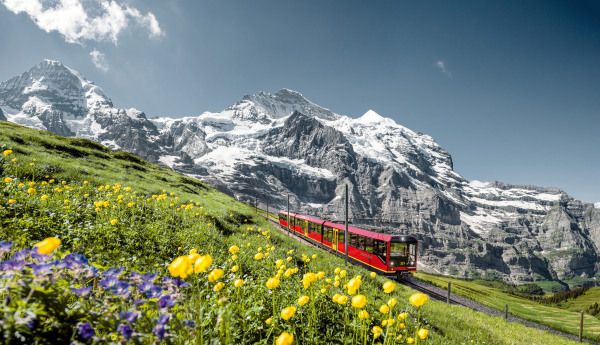
Jungfrau Railways, in the UNESCO World Heritage Site Jungfrau Region of Switzerland, is a leader in the sustainable tourism industry. In 2022, the Railways partnered with the University of Bern to pursue a carbon-neutral tourism region by the year 2035. This year, Jungfrau Railways set forth seven (7) Sustainable Development Goals, modeled in part after the United Nations’ 17 SDGs, committed to climate protection, careful use of nature, gender equality and opportunity, and more. The company’s annual report also calculates its carbon footprint based on CO2 emissions and proposes active changes that could be made to help curb it.
Promoting sustainability through its daily operations is a primary goal of the Swiss company, consisting of both a cogwheel train that runs to the highest train station in Europe and the Eiger Express gondola, which brings travelers from Grindelwald to the nearby Mannlichen peak.
Braking systems onboard descending trains are used to power acceleration on ascending trains. In financial year 2020, the railway used 2,870,000 kWh of electricity to power its trains, but returned a remarkable 1,450,000 kWh to the grid. The company also employs environmental oversight personnel to maintain the incredible Swiss landscape while still encouraging sustainable construction. Jungfrau Railways’ V-Cableway project only proceeded when the Environmental Construction Supervisor gave the final confirmation, after preparing construction reports and monitoring the effects of the construction on local flora and fauna. To learn more about Jungfrau Railways’ ongoing sustainability projects, please read the latest environmental report.

